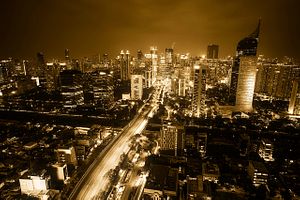Despite criticism amid the COVID-19 pandemic, Indonesia is still planning to move its capital from Jakarta. The plan, which was initiated during the first term of the Joko “Jokowi” Widodo administration, was driven by the fact that Jakarta is no longer able to be the center of governance while also being the national center for business, finance, trade, and logistics.
At the same time, Jokowi sees Java, the island where Jakarta is located, is getting overly crowded, with a population of 150 million or 54 percent of Indonesia’s total population of 269.6 million.
Jokowi thus decided to move the capital to the North Penajam Paser and Kutai Kartanegara areas in East Kalimantan. The National Development Planning Agency (Bappenas) proposed that the new capital development master plan is targeted to be completed in July 2020.
The two areas of North Penajam Paser and Kutai Kartanegara were chosen for several reasons: the risk of natural disasters is minimal, whether floods, tsunamis, forest fires, volcanoes, or landslides; the location is strategic, in the middle of Indonesia; and, more importantly, there are 180,000 hectares of government-controlled land available.
The government has pegged the cost of relocating the new capital at $33 billion dollars. The state budget will fund 19.2 percent of that, which will be used for basic service infrastructure, construction of the National Palace and buildings for the police and army, as well as official housing, green open space, and military bases.
Other funding will come from public-private partnerships (PPP) worth 265.2 trillion rupiahs or as much as 54.6 percent of the total cost. The private sector will also contribute a portion of 26.2 percent for the construction of transportation systems, telecommunications, and renewable energy projects.
To realize this gigantic plan, Jokowi formed a new capital steering board consisting of the Crown Prince of Abu Dhabi, Sheikh Mohammed bin Zayed Al Nahyan, Softbank CEO Masayoshi Son, and former British Prime Minister Tony Blair.
There are several reasons behind the choice of the steering committee for the new capital; most notably Jokowi wants to gain international trust in the development. It is crucial to note that these figures are well known around the world. Mohammed bin Zayed Al Nahyan is currently developing the world’s first zero-carbon city in Masdar. Meanwhile, Masayoshi Son is the CEO of a large telecommunications and media company from Japan and Tony Blair was prime minister of Britain for 10 years, from 1997 to 2007.
The minister of Bappenas, Suharso Monoarfa, however, revealed that there are a number of countries interested in becoming investors in Indonesia’s new capital, including China, Japan, Saudi Arabia, the United States, the United Kingdom, and Germany.
Nonetheless, it seems that Jokowi’s policy for developing the new capital is somewhat different from his usual foreign policy. As is widely known, Indonesia has received plenty of investment funds from China for development and infrastructures and Beijing is currently working on various infrastructure projects in the country.
That begs the question: why does Jokowi not take China as a partner in the construction of the new capital city? For example, looking at the 127.3 trillion rupiah in funding supposed to come from private entities, it seems that it would not be difficult at all for China to provide those funds.
Jakarta’s decision to not involve China in the new capital city plan appears to be the result of an increasingly prevalent negative perception of China in Indonesia in recent years as the Belt and Road Initiative is being realized. It is possible that the slow realization of BRI projects in the country made the government in Jakarta rethink collaborating with China in moving its capital. Some, for instance, have voiced concerns regarding the potential for a “debt trap” and environmental destruction potentially brought about by BRI projects.
It is also important to note that domestically Jokowi’s plan to move the capital has been a contentious issue, which has taken a toll on the president’s image. In fact, a survey carried out by the KedaiKOPI survey institute revealed that 95.7 percent of Jakartans reject the plan. Scholars have also argued that the plan is not feasible and would not solve the underlying issues the government aims to address.
Therefore, Jokowi seems to be taking more careful steps so as to minimize debate over the already contentious subject. For him, partnering with China, which is also a controversial topic in Indonesia, would make the plan for the new capital doubly contentious. And Jokowi appears to want to avoid that.
This reality should indeed be a wake-up call for Beijing. Indonesia, one of its major trade partners and investment destinations, is turning elsewhere for a major project.
Alongside strengthening its economic footholds in the archipelago, there is also a need for China to mend its image in Indonesia. If Jokowi is really avoiding partnering Beijing because it will make the capital relocation plan more contentious, it means that something has to be done.
This can be done through a variety of soft power avenues such as increasing state exchanges, cultural and educational exchanges, and media efforts. These have been increasingly apparent in recent years, but have to be strengthened and expanded.
If this is not realized by Beijing, there is a possibility that Indonesia will more and more seek to strengthen partnerships with other countries, but not China.
Dr. Muhammad Zulfikar Rakhmat is an academic at Universitas Islam Indonesia.
Dimas Permadi is a graduate of Universitas Islam Indonesia.
































